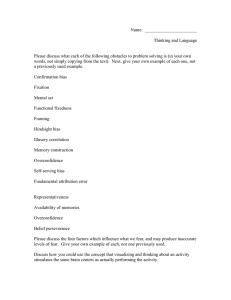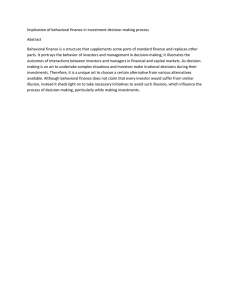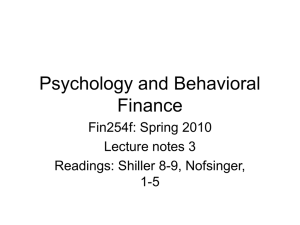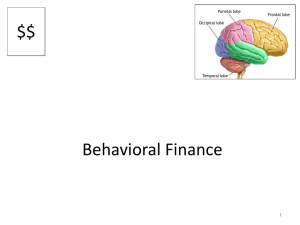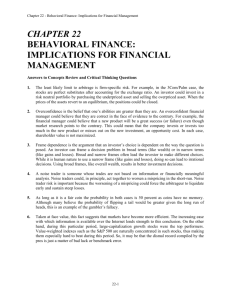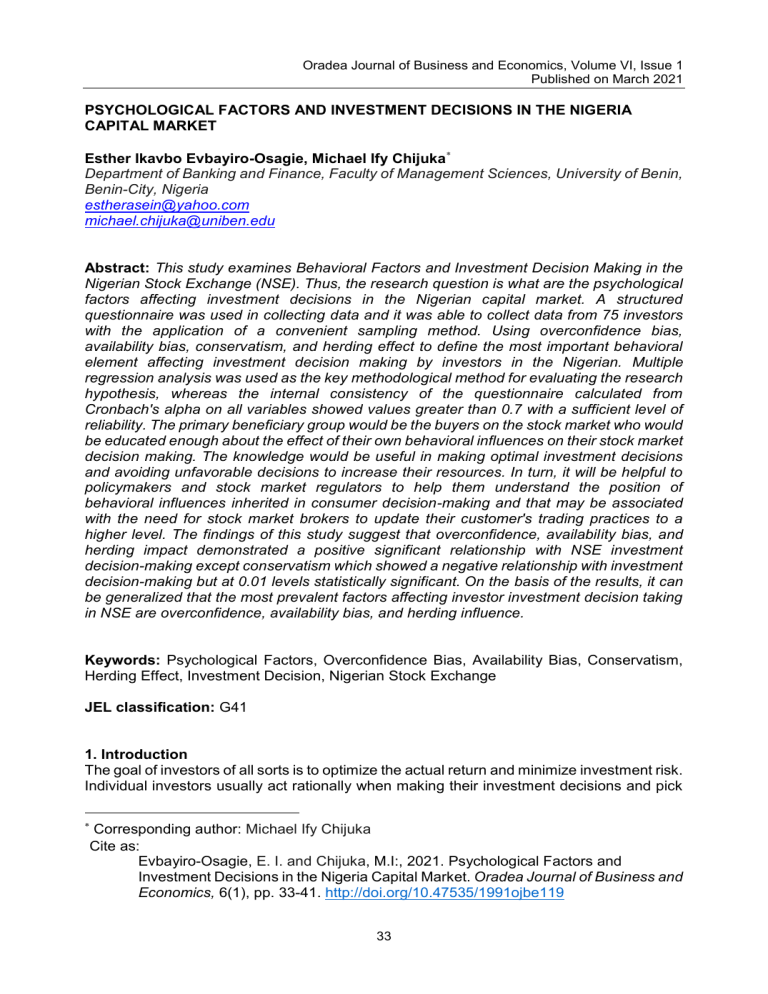
Oradea Journal of Business and Economics, Volume VI, Issue 1 Published on March 2021 PSYCHOLOGICAL FACTORS AND INVESTMENT DECISIONS IN THE NIGERIA CAPITAL MARKET Esther Ikavbo Evbayiro-Osagie, Michael Ify Chijuka Department of Banking and Finance, Faculty of Management Sciences, University of Benin, Benin-City, Nigeria estherasein@yahoo.com michael.chijuka@uniben.edu Abstract: This study examines Behavioral Factors and Investment Decision Making in the Nigerian Stock Exchange (NSE). Thus, the research question is what are the psychological factors affecting investment decisions in the Nigerian capital market. A structured questionnaire was used in collecting data and it was able to collect data from 75 investors with the application of a convenient sampling method. Using overconfidence bias, availability bias, conservatism, and herding effect to define the most important behavioral element affecting investment decision making by investors in the Nigerian. Multiple regression analysis was used as the key methodological method for evaluating the research hypothesis, whereas the internal consistency of the questionnaire calculated from Cronbach's alpha on all variables showed values greater than 0.7 with a sufficient level of reliability. The primary beneficiary group would be the buyers on the stock market who would be educated enough about the effect of their own behavioral influences on their stock market decision making. The knowledge would be useful in making optimal investment decisions and avoiding unfavorable decisions to increase their resources. In turn, it will be helpful to policymakers and stock market regulators to help them understand the position of behavioral influences inherited in consumer decision-making and that may be associated with the need for stock market brokers to update their customer's trading practices to a higher level. The findings of this study suggest that overconfidence, availability bias, and herding impact demonstrated a positive significant relationship with NSE investment decision-making except conservatism which showed a negative relationship with investment decision-making but at 0.01 levels statistically significant. On the basis of the results, it can be generalized that the most prevalent factors affecting investor investment decision taking in NSE are overconfidence, availability bias, and herding influence. Keywords: Psychological Factors, Overconfidence Bias, Availability Bias, Conservatism, Herding Effect, Investment Decision, Nigerian Stock Exchange JEL classification: G41 1. Introduction The goal of investors of all sorts is to optimize the actual return and minimize investment risk. Individual investors usually act rationally when making their investment decisions and pick Corresponding author: Michael Ify Chijuka Cite as: Evbayiro-Osagie, E. I. and Chijuka, M.I:, 2021. Psychological Factors and Investment Decisions in the Nigeria Capital Market. Oradea Journal of Business and Economics, 6(1), pp. 33-41. http://doi.org/10.47535/1991ojbe119 33 Oradea Journal of Business and Economics, Volume VI, Issue 1 Published on March 2021 their optimal portfolio weighting by assessing the risk-return tradeoff within an effective mean-variance boundary. Taking investment decisions is heavily dependent on various external and internal considerations. Some internal influences are primarily related to human behavior and external factors are linked to company performance and market information. Overconfidence, conservatism, availability bias, herding effects, market factors, anchoring, representativeness, gambler's fallacy, loss aversions, regret aversions, etc. would be some internal factors or behavioral factors which rely on the investor's mind. Many researchers have undertaken several experiments with different approaches to explore the association between the behavioral component and investment decision taking while evaluating the empirical evidence in this regard. Several studies have said behavioral influences have a significant impact on business investment decision making. Accordingly, Bakar and Amelia (2016) reported that behavioral factors like overconfidence and conservatism have a significant impact on Malaysian stock investment decisions. Waweru (2008) reported that the herding effect and market factors in the Nairobi Stock Exchange have the greatest impact on investment decision making. Conversely, some researchers have said behavioral considerations have no significant impact or adverse effect on business investment decision making. Ngoc (2018) opines that behavioral factors like anchoring and loss aversions have no significant relationship with security market investment decision-making in the Ho Chi Minh City of Vietnam. Wamen, (2017) explained how behavioral factors will influence investment decision-making in the Kenya Stock Exchange and stressed that loss aversions has insignificant impact on investment decision in Kenya Stock Exchange This study is carried out in relation to the behavioral variables in the Nigerian Stock Exchange regarding investment decision making. The primary beneficiary group would be the buyers on the stock market who would be educated enough about the effect of their own behavioral influences on their stock market decision making. The knowledge would be useful in making optimal investment decisions and in avoiding unfavorable decisions to increase their resources. In turn, it will be helpful to stock market regulators and policymakers to help them understand the position of behavioral influences inherited in consumer decision-making and that may be associated with the need for stock market brokers to update their customer's trading practices to a higher level. As a result of the above inconsistencies in the research results and findings, this study found that there is a question to be answered "Is there any effect of behavioral influences in the Nigerian Stock Exchange on investment decision making?" This research is therefore aimed at exploring the effect of behavioral influences on Nigerian Stock Exchange investment decision-making. The behavioral factors include overconfidence, availability bias, conservatism and herding behavior of NSE investors. The population includes all the investors holding stock in the Nigerian Stock Exchange. Institutional investors included banks, investment companies listed on the Nigerian Stock Exchange, private listed companies, etc., while individual investors are included with entrepreneurs, undergraduate investors, company executives, physicians, bachelors, etc. based on convenience sampling approach 75 investors made up the sample spaces for collecting qualitative data on behavioral factors. As a behavioral study, this would be facilitated to identify the real picture of the mindsets of investors on their decision -making practices. 2.1 Literature Review 2.1.1 Overconfidence on Investment Decision Making Many people overestimate their knowledge and skills to be accurate. In human minds, the concept of overestimation is implied by overconfidence which causes investors to 34 Oradea Journal of Business and Economics, Volume VI, Issue 1 Published on March 2021 overestimate and believe their predictive skills. Odean (1998), opines that those investors that have a higher degree of overconfidence usually choose a more volatile portfolio compared to those with a lower degree of overconfidence. Qobri and Shabbir (2019) investigated the effect on investor decision-making at the Islamabad Stock Exchange in Pakistan of over-confidence and illusion of control biases. The main aim of the analysis was to test the effect of overconfidence and power distortion on the investment decision-making process. The data were obtained using questionnaires from Islamabad Stock Exchange investors and brokers. Results from the research showed that the overconfidence in the Islamabad Stock Exchange has had a significant impact on investor decision making. The researcher also said that people think their expertise, background, and income have a great impact on investment decisions, whereas male investors are more optimistic than female investors. According to Bakar and Amelia (2016), the bias of overconfidence associated with the bias of self-attribution is an individual's tendency to over exaggerate their ability while blaming failure on other people. The scholars studied the connection between psychological factors in the Malaysian stock market, namely overconfidence, conservatism bias, herding impact, and availability bias and investor decision making. To approximate the impact of the chosen behavioral variables on investor decision making, multiple regression model was used. The results of regression demonstrated that the behavioral factor of overconfidence has a positive effect on investor decision making. 2.1.2 Herding Behavior on Investment Decision Making Herding behavior is defined as the propensity of investor activities to follow the actions of others. In terms of investment, herding behavior is in the context of how the opinion of certain investors about the investment would be based on one another. Luong and Thu Ha (2011) have shown that the herding investor would focus his investment decision on the crowded activity of buying and selling, causing the trend of speculative bubbles and rendering the stock market inefficient. Ngoc (2018) investigated the impact of behavioral influences on individual investor decisions at Security market in Vietnam's Ho Chi Minh City. Independent variables of the analysis were behavioral factors like herding, market factors, prospect overconfidence-the fallacy of gamble, anchoring -ability bias whereas the contingent variable was the decision-making of investors. Research findings showed that herding influences investor's decision of individual investors at the Security market in Vietnam's Ho Chi Minh City. An empirical study by Wamen (2017) conceived the review by concentrating on investment banks in Kenya to explore the effect of behavioral influences on investment decision taking in Kenya Stock Exchange. The researcher focused primarily on defining the connection between behavioral influences that included risk aversion, prospecting, anchoring, and herding across primary data on investment decision making. The questionnaire consisted of both near and open-ended questions and the final results of this analysis showed that all behavioral influences influencing investment decisions in Kenya's stock market. Furthermore, the study revealed that the herding effect was having a significant impact on investment decisions. 2.1.3 Availability Bias on Investment Decision Making Availability Bias relies on the actions of the buyer. The availability bias arises when the user relies on information that is easily obtained from recent times. Nofsingera and Varmab (2013) opines that investors often tend to focus their attention on a particular fact rather than the overall situation, precisely because this particular fact is more readily or more rapidly remembered in their minds. Barber and Odean (2001) opines that most investors place undue weight on the knowledge that is readily available on the market and also clarified that 35 Oradea Journal of Business and Economics, Volume VI, Issue 1 Published on March 2021 most investors prefer purchasing shares from local companies rather than from international companies. 2.1.4 Conservatism on Investment Decision Making Conservatism implies people are using traditional investment decision-making methods, and they are not using new market analysis and appropriate investing knowledge. The conservatism bias means investors are slow to react to recent evidence and progress and to change their conviction (Bakar and Amelia, 2016). Lim (2012) investigates the relationship between psychological prejudices, including overconfidence, conservatism bias, herding, and regret in Malaysian stock market decision-making. Findings from this analysis stressed that overconfidence bias; conservatism bias and remorse had significant positive impacts on Malaysian stock market decision-making by investors. Bakar and Amelia (2016) conducted an empirical study to explore the relationship between psychological factors, namely over-confidence, conservatism bias, herding effect and availability bias on Malaysian stock market investor decision-making, and found that conservatism has a positive impact on investor decision-making as a major factor. 2.1.5 Behavioral Factors on Investment Decision Making Masomi and Ghayekhloo (2011) studied the role of behavioral finance and investor psychology in investment decision-making at the Tehran Stock Exchange on the basis of behavioral finance and investor mind, with particular reference to 23 institutional investors. The behavioral factors including representativeness, over-confidence, anchoring, gambler's fallacy, risk aversion, regret and mental accounting affected the decisions of institutional investors trading on the Tehran Stock Exchange, and these factors were also divided into four main figures, such as the heuristics simplification, market information, herding effect, and prospector theory. The data were gathered from questionnaires and research findings found that both behavioral variables, including heuristic methods, prospect theory, and market information, have the greatest impact on investment decisions in Tehran's stock exchange. Wamen (2017) conducted his research to assess the impact of behavioral influences on Kenya Stock Exchange investment decisions with a population of 17 investment banks in Kenya. The study focused primarily on figuring out the association between behavioral influences and decision making for investment. The behavioral factors of this analysis were risk aversion, prospecting, anchoring, and herding, while the questionnaire consisted of both near and open-ended questions. The overall results of this study showed that all behavioral variables in the Kenya stock market have been impacted by investment decisions. In fact, the analysis claimed that the herding impact was more important to prospecting and anchoring of investment decisions. Eventually, the risk aversion element impacts investment decisions on Kenya's stock market at a lower level. Hassan, Khalid and Habib (2014) performed their research from the viewpoint of demographic factors to figure out the impacts of gender and age on two of the behavioral traits, such as overconfidence and risk aversion, with respect to Pakistan. Researchers used questionnaire-based survey methods to gather sample data, including 391 Pakistani persons, while R-square and correlation analysis were used to approximate the association between independent variables and dependent variables. At the end of the study, it was reported that male and older investors tend to be more overconfident and women and older investors appear to be more averse to failure. In fact, the analysis reported that the gender and age of investors have a positive relationship with overconfidence and loss-averse Atif (2014) examined the interrelationship in the Islamabad Stock Exchange between implicit prejudices and the impact of those biases on investment decisions. The study focused on three major bias namely self-attribution, bias overconfidence, and optimism bias. The key 36 Oradea Journal of Business and Economics, Volume VI, Issue 1 Published on March 2021 purpose of this study was to establish the relationship between the biases and their impact on investor decision making at the Islamabad Stock Exchange. Study findings found that all bias was adversely affected by the decision making of Islamabad Stock Exchange's Pakistan investors except for the bias of overconfidence. Because research has shown that the overconfidence bias of the investor has a positive relationship / positive effect on the Islamabad Stock Exchange investment decision. Kumar and Goyal (2015) examined behavioral biases on investment decision making, including overconfidence, attitude influence, herding bias, and home bias/familiarity bias. They have used the approach of systematic literature review to study and evaluate articles relating to personality differences in investment decision making, including 177 chosen reports. Since this study was based on empirical observations by previous researchers, behavioral biases were hypothesized to have an effect on investment decisions. Bakar and Amelia (2016) analyzed the interaction between psychological factors in the Malaysian Stock Market that include overconfidence, conservatism bias, herding impact and availability bias on investor decision making. Data were obtained from survey questionnaires issued to two hundred individuals, which includes finance graduates, bank employees, executives and managers active in the Malaysian Stock Market. The questionnaire composed of Likert scales and close-end questions. Multiple regression model was used to measure the impact of chosen behavioral variables on the decision-making of investors. The findings of the regression revealed that the behavioral variables of overconfidence have a positive effect on investor decision making since the approximate coefficient and availability bias have a positive impact on investor decision making in the Malaysian stock market. However herding effect and conservatism were found to have no significant impact on investor’s decision making. 3. Methodology This study aims at identifying the impact of behavioral factors on investment decision making in Nigeria. Seventy-five sample respondents were qualified, and data were collected through a structured questionnaire by interviewing selected investors in Nigeria. Self-completion method is chosen for collecting quantitative data and semi-structured interview method is used to gather qualitative data for this study Overconfidence, conservatism, herding effect and availability bias is considered as independent variables and the investment decision of individuals in the Nigerian stock exchange would be the dependent variable 3.1 Data Collection and Sampling The study was based mainly on the primary data, and data were collected from 75 respondents who were trading as individual investors in the Nigerian Stock Exchange. It covers all individual security market investors in Nigeria. The period of study covers investment decisions made in the past five years up to 2019. This study was carried out in 2019. A 5-point Likert scale ranging from 1 (Strongly disagree) to 5 (Strongly agree) was employed in this study. The 5-point Likert scales are rating scales utilized to ask the individual investors to evaluate the degrees of their agreement with the impacts of behavioral factors on their investment decision. They were primarily held in Nigeria and data were gathered by means of a questionnaire by interviews with selected investors as the sample space generated from the convenience sampling technique. 37 Oradea Journal of Business and Economics, Volume VI, Issue 1 Published on March 2021 3.2 Data Analysis Descriptive statistics and correlation coefficients were used to test the hypothesis while the main tool for drawing a better conclusion was the Regression analysis, including a reliability study to verify the internal consistency of the questionnaire. The related regression model is shown as follows to examine the impact of Behavioral variables on investment decisions: IDM = α+ β1 OC + β2 AB +β3 HE + β4 CV+ ε IDM = Investment Decision Making, OCB = Overconfidence, AB = Availability Bias, HE = Herding Effect CV = Conservatism, α = Constant, ε = Error Term 4. Data Analysis and Discussion The analysis was conducted using Descriptive Statistics, Correlation Coefficients and Regression Analysis analytical tools to check whether or not the generated theory that was used to address research questions can be accepted whereas the reliability review was conducted as follows to assess the internal consistency of the established questionnaire based on the inter-item correlation average. Table 1: Reliability Analysis Variables Investment Decision Making Overconfidence Availability bias Conservatism Herding effect Cronbach’s alpha 0.8100 0.9480 0.7730 0.7820 0.7760 Source: Research Data The internal consistency measured by Cronbach's alpha value was deemed to be greater than 0.7 in each variable implying that the questionnaire's reliability was satisfactory. Table 2: Descriptive Analysis Maximum Overconfidence Availability Bias Conservatism Herding Effect Investment Decision Making 2.330 1.500 2.670 1.500 2.620 Minimum Mean 4.330 4.170 4.500 4.330 4.250 3.35330 3.55330 3.64000 3.28670 3.39000 Std. Deviation 0.529150 0.517100 0.420960 0.663600 0.395260 Source: Research Data Table 2 descriptive analysis shows the descriptive statistics of all factors comprising of the data set's Maximum Minimum Mean, and Standard deviation. The mean values of the variables reflect the mean values in the data set. The standard deviation values show whether the mean values are clustered around the median or far and wide spread. As stated, with their mean values respectively all the variables seemed to be dispersed widely. 38 Oradea Journal of Business and Economics, Volume VI, Issue 1 Published on March 2021 Table 3: Correlations IDM OC AB CV HE IDM 1 .334** .405** -.241* .218* OC AB CV HE 1 .120 .073 -.241* 1 .276** -.150 1 -.113 1 * At 0.05 Level, Correlation Is Significant (1-Tailed). **At the 0.01 Level, Correlation Is Significant (2-Tailed). Source: Research Data Table 3 indicates that the correlation with overconfidence, availability and herding effect have a positive correlation and a substantial interaction whereas conservatism tends to be negatively and substantially associated with investment decision taking by suggesting that all of the variables examined in this analysis would have a significant impact on the dependent variable. Table 4: Regression Result IDM = β + β1 OC + β2 AB + β3 HE 0 + β4CV + ε β1 β2 β3 β4 β0 1.629 R Square:0.801 0.286* 0.393* -0.349* 0.206* Adjusted R-Square: 0.730 N = 75 * Significant at 5% Source: Research Data Table 4 shows the results of the multiple regression analysis which consists of the values of the model with unstandardized variables, R Square, and Modified R Square for the purpose of examining the relationship between the dependent variable and independent. R shows the association between the real and anticipated values of the dependent variable and the R Square factor indicates that the behavioural variables of this study describe the investment decision variance of 80.1 per cent. The study’s regression result shows that again all independent variables such as overconfidence, availability bias and herding effect represent the positive significant relationship between investment decision making at 0.01 level significant level in NSE excepting variable of conservatism, it represents the negative relationship with investment decision making but statistically significant at 0.01 level. Based on the findings emphasized overconfidence, availability bias and herding effect are the most factors for investor’s investment decision making in NSE. 5. Conclusion This study examined the impact of behavioral factors on Nigerian stock exchange investment decision making. The variables identified for this study are overconfidence, availability bias, conservatism and herding effect. This study also identifies the most significant behavioral factor influencing investment decision-making by investors. The main objective of this study was to identify the main behavioral factors affecting investor decision making in the Nigerian Stock Exchange and the second goal is to identify the relationship between overconfidence, availability bias, conservatism and herding effect for investment 39 Oradea Journal of Business and Economics, Volume VI, Issue 1 Published on March 2021 decision making in the NSE. The study population comprises all Nigerian Stock Exchange investors and used convenience sampling method for chosen stock holding investors on the Nigerian Stock Exchange and consists of seventy-five Nigerian investors. All the information and data for this study are collected from primary sources using a structured questionnaire. Descriptive Statistic and multiple regression methods are used to draw conclusions and check the conceptual correlations in the results. At first; run the reliability test and descriptive statistics are used to verify the questionnaire's reliability and all variables get more than 0.7 values and the characteristics of the variables can be acknowledged and verified. Furthermore, the Pearson correlation coefficient is used to test the causal relationship between the variables. All independent variables such as overconfidence, availability bias and herding effect represent the positive significant relationship between investment decisions in NSE except conservatism variable; it reflects negative relationship with investment decision-making. At third multiple regressions the mutual interaction is evaluated as elaborated in hypotheses and also used to attain the targets. Multiple linear regression methodology is used to accomplish the goals. The study’s regression result shows that again all independent variables such as overconfidence, availability bias and herding effect represent the positive significant relationship between investment decision making at 0.01 level significant level in NSE excepting variable of conservatism, it represents the negative relationship with investment decision making but statistically significant at 0.01 level. Based on the findings emphasized overconfidence, availability bias and herding effect are the most factors for investor’s investment decision making in NSE. In view of the limitations that constrained in this study, it can be provided with suggestions for subsequent studies in future. As the current study aimed to identify impact of investor’s behavioral factors on investment decision making of Western province stock holding investors it can move for another sample segments such as institutional investors, daily trading investors in NSE etc. Furthermore, it can contribute to assessment of other behavioral factors in Nigerian Stock Exchange such as anchoring, representativeness, gambler’s fallacy, loss aversions, regret aversions, etc. The concepts of behavioral factors can be incorporated with equity price, market turnover in relation with equity prices will be moreover facilitated for investment decision making which may be useful for brokerage companies, stock market regulators and policymakers to make good decision about investor’s mind. References Atif, K., 2014. Interrelationship of Biases: Effect Investment Decisions Ultimately. Theoretical and Applied Economics XXI, 6 (595), pp.85-110. Bakar, S., and Ng Chui Yi, A., 2016. The Impact of Psychological Factors on Investors’ Decision Making in Malaysian Stock Market: A Case of Klang Valley and Pahang. Procedia Economics and Finance 35 (19) pp.319-328. https://doi.org/10.1016/S2212-5671(16)00040-X Barber, B.M., and Odean, T., 2001. Boys will be Boys: Gender, Overconfidence, and Common Stock Investment. The Quarterly Journal of Economics, pp.261-292. Hassan, T.R., Khalid, W., and Habib, A., 2014. Overconfidence and Loss Aversion in Investment Decisions: A Study of the Impact of Gender and Age in Pakistani Perspective. Research Journal of Finance and Accounting, 5 (11), pp.148- 157. Kumar, S., and Goyal, N., 2015. Behavioral Biases in Investment Decision Making – Systematic Literature Review. Qualitative Research in Financial Markets, 7 (1), pp. 88 – 108. https://doi.org/10.1108/QRFM-07-2014-0022. 40 Oradea Journal of Business and Economics, Volume VI, Issue 1 Published on March 2021 Lim, L.C., 2012. The Relationship between Psychological Biases and the Decision Making of Investor in Malaysian Share Market. Unpublished Paper International Conference on Management, Economics and Finance (ICMEF) Proceeding, pp.1-16. Luong, L. P., and Thu Ha D. T., 2011. Behavioral Factors Influencing Individual Investors’ Decision -Making and Performance A Survey at The Ho Chi Minh Stock Exchange. Unpublished M.Sc. Thesis, Umea School of Business. Masomi, S.R., and Ghayekhloo, S., 2011. Consequences of Human Behavior’s in Economic: The Effects of Behavioral Factors in Investment Decision Making at Tehran Stock Exchange. 2010 International Conference on Business and Economics Research vol.1 (2011) IACSIT Press, Kuala Lumpur, Malaysia IACSIT Press, pp. 234-237. Ngoc, L.T.B., 2018. Behavior Pattern of Individual Investors in Stock Market. International Journal of Business and Management; 9(1), pp. 1-16. https://doi.org/10.5539/ijbm.v9n1p1. Nofsingera, J. R. and Varmab, A., 2013. Availability, Recency and Sophistication in the Repurchasing Behavior of Retail Investors. Journal of Banking and Finance 37 (7), pp 2572– 2585. https://doi.org/10.1016/j.jbankfin.2013.02.023. Odean, T., 1998. Are Investors Reluctant to Realize Their Losses? Journal of Finance, 53(5), pp.775-1798. https://doi.org/10.1111/0022-1082.00072. Qobri, S.U., and Shabbir, M., 2019. An Empirical Study of Overconfidence and Illusion of Control Biases, Impact on Investor’s Decision Making: An Evidence from ISE. European Journal of Business and Management, 6 (14), pp. 38-44. Wamen, J.N., 2017. Behavioral Factors Influencing Investment Decision in Stock Market: A Survey of Investment Banks in Kenya. International Journal of Economics and Finance, 1 (5), pp. 1-15. Waweru, N.M., Munyoki, E., andUliana, E., 2008. The Effects of Behavioral Factors in Investment Decision-Making: A Survey of Institutional Investors Operating at the Nairobi Stock Exchange. International Journal of Business and Emerging Markets, 1 (1), pp.24-41. https://doi.org/10.1504/IJBEM.2008.019243. Bio-note Esther Ikavbo Evbayiro-Osagie is a senior lecturer and currently the Head of Department of Banking and Finance, University of Benin, Benin City, Nigeria. She holds a PhD in Business Administration with specialization in Financial Management. She has attended numerous academic conferences and has published in numerous learned journals of international reputation. Her area of research interest is corporate finance, investment finance, behavioural finance and strategic management. Chijuka I Michael holds a PhD in Finance from the University of Benin, Nigeria, distinction in M.Sc Finance from Coventry University, England and a First class honours in Banking and Finance from the University of Benin, Nigeria. He presently works as a Lecturer at the University of Benin, Nigeria. His areas of specialization include: element of banking, mathematical logic, financial management, business statistics, quantitative methods, investment management, actuarial mathematics and behavioural finance. 41
